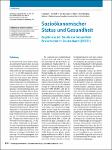Sozioökonomischer Status und Gesundheit
Ergebnisse der Studie zur Gesundheit Erwachsener in Deutschland (DEGS1)
Lampert, Thomas
Kroll, Lars Eric
Lippe, Elena von der
Müters, Stephan
Stolzenberg, Heribert
Analysiert wird der Zusammenhang zwischen dem sozioökonomischen Status (SES) und 5 exemplarisch ausgewählten Gesundheitsoutcomes in der 18- bis 79-jährigen Bevölkerung Deutschlands. Die Datenbasis wird durch die „Studie zur Gesundheit Erwachsener in Deutschland“ (DEGS1) gebildet, die das Robert Koch-Institut im Zeitraum von 2008 bis 2011 durchgeführt hat (n=8152). Der sozioökonomische Status wird über einen mehrdimensionalen Index erfasst, in den Informationen zum Bildungsniveau, zur beruflichen Stellung und zum Netto-Äquivalenzeinkommen eingehen. Die Ergebnisse zeigen, dass Personen mit niedrigem sozioökonomischem Status im Vergleich zu denen mit mittlerem und hohem sozioökonomischem Status ihren allgemeinen Gesundheitszustand schlechter einschätzen und häufiger an Diabetes erkrankt sind. Außerdem ist bei ihnen das Risiko für eine depressive Symptomatik, Adipositas und sportliche Inaktivität erhöht. Die Ergebnisse machen deutlich, dass die Gesundheitschancen und Erkrankungsrisiken nach wie vor sehr ungleich verteilt sind. Sie unterstreichen damit die Bedeutung von politischen Interventionen zur Verringerung der gesundheitlichen Ungleichheit. The analysis focuses on the connection between socioeconomic status (SES) and five health outcomes in the 18- to 79-year-old population of Germany. It uses data from the German Health Interview and Examination Survey for Adults (DEGS1) which the Robert Koch Institute conducted in the period from 2008–2011 (n=8,152). Socioeconomic status is recorded via a multidimensional index which includes information on education attainment, occupational status and household income. The results show that persons with a low socioeconomic status have a self-rated health status which is worse than that of persons with a medium or high socioeconomic status, and that they have diabetes more frequently. They also have a higher risk of depressive symptoms, obesity and no sports activity. The results illustrate that health chances and the risk of illness are still very socially unevenly distributed, thus emphasising the significance of political interventions to reduce health inequalities. An English full-text version of this article is available at SpringerLink as supplemental.
No license information

